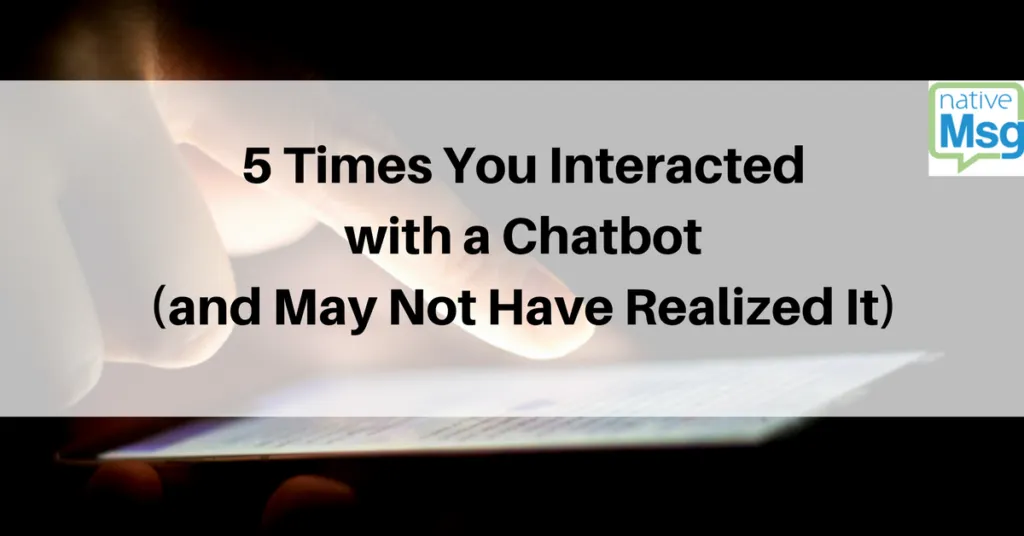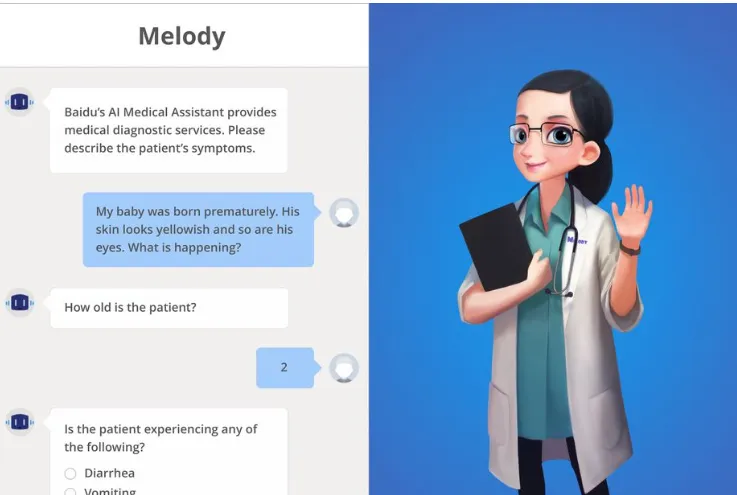
Theses days, there are a handful of well-known chatbots (if a chatbot could have celebrity, that is). Cleverbot, Mitsuku and Woebot have garnered much of the buzz surrounding intelligent chatbots. But when it comes to customer engagement strategies, does that make the now over 100,000 virtual “dayplayer” chatbots less useful or engaging? Hardly. In fact, per Business Insider, enterprise businesses are continuing to invest in developing effective chatbot applications that are even more user-friendly and offer an organic conversational experience. However, there are already businesses and organizations that have deployed chatbots that are so effective you either don't know you've been served by it or may not realize you've engaged with one. That is, if you hadn’t been tipped to the fact at first.For most consumers, that’s just not cool. A majority of you want to know when you’re interacting with one. Conversely, in a HubSpot survey for shoppers, 40 percent of you don’t care whether an AI-tool or a human helps you as long as you’re getting the actual help you need.But, in some instances, it might not be a bad thing, or actually matter, if you don’t realize you’re interacting with a chatbot. In fact, the unique or high-level of service an intelligent chatbot provides may make it less important to you. Here’s a look at examples of chatbots that have served you and you may not have realized it.
Dating Apps
We won’t name these apps specifically, and chances are, you probably already had a bit of an idea that you've encountered a chatbot. But in the moment, at first, many users are engaged enough to continue a conversation with a bot you thought was human. Why is this important? The application worked well enough for long enough. But most importantly, it points to the premise that consumers are also willing to allow some room for error if the reason for an interaction is sufficiently motivating.
Business Model Takeaway:
Even simple solution applications are an exceedingly better fit when a consumer is motivated enough to continue. Time-sensitivity is one of the most highly motivating factors. Deploy a chatbot for these types of time-sensitive questions:
- Healthcare and Pharma: Quick response for medication interactions.
- Accounting: Easy updates and notifications on tax code changes, both internally and customer-facing.
- Licensing and Credentialing: Professionally and personally, deadlines for licenses or credential renewals can be eased with a simplified chatbot service for appointment, extension or renewal requests.
Banking: A Bot for Legal AccuracyTechnically, JP Morgan Chase’s chatbot, COIN, isn’t consumer-facing, but that doesn’t mean you haven’t experienced the benefits of it or that it’s been altogether what you think it is. JP Morgan launched “Contract Intelligence” (COIN) in 2017 to review commercial loan agreements. It’s saved the bank millions of dollars and can do in seconds (yes, seconds) what took lawyers an estimated 360,000 hours annually. A commercial loan you may have had to wait on while it made its way through underwriting and legal review may take much less time to transact. Not to mention, COIN is much more accurate than humans.
Business Model Takeaway:
Intelligent chatbots that provide markedly higher accuracy rates can assuage consumer hesitation to engage with them when the benefit is reliable.
- Education: online post-secondary and university courses have increasingly become the launch-point for AI-led curriculum. Students learn based on what they need to learn about a subject and not on what they already know. Chatbot applications in this sphere can create truly personalized pathways in learning and curriculum. Likewise, the application can serve students at all levels to better connect and re-engage in learning.
- Remote diagnostics: the automotive industry is already embracing remote diagnostics. This application can serve consumers in numerous areas. A chatbot for roadside assistance or on the home front for mechanical malfunctions can be a game-changer for consumer convenience.

Diagnostics and Surgery
Radiologists can now make use of AI-tools, which can include conversational applications like chatbots, to read and diagnose X-rays. Likewise, AI-led surgery is already occurring. If those facts are surprising, or even somewhat alarming as a nod to a real-life dystopic realm, it may not be as ominous as it sounds. The Smart Tissue Autonomous Robot (STAR) is on it’s way to being capable of performing soft-tissue surgery without human support. While this tech is still in the birthing stages, x-ray diagnostics, supported by AI, are not. Chances are, at some point, you’ve received feedback about results that an AI-tool, like a chatbot, has created. Your radiologist or doctor may have relayed the information, but an intelligent bot may have provided the findings.
Business Model Takeaway:
Building an intelligent chatbot that performs better than a human takes tremendous resource. But the reality is that a life or death situation made more promising by chatbot technology can supplant a consumer’s need for ultimate transparency. While transparency and technology should go hand-in-hand, it points back to consumers’ ultimate desire for helpfulness as a driving motivator for adoption.
- Emergency service: If a chatbot can initiate a dispatch faster and more accurately, as some emergency service providers have already experienced, consumers are better served overall.
Basic, Universal Healthcare Access:
From Baidu to Babylon Health and Your.MD, chatbots for responsive basic medical support are now available. But you may not have realized you were speaking to a chatbot when booking an appointment for a doctor or when revealing your symptoms to one while awaiting medical feedback from a doctor. The question is, when you’re ill and you need a speedy intake process, do you really care?[caption id="attachment_398" align="aligncenter" width="737"]

Image Source: Baidu Doctor App[/caption]While Baidu’s chatbot, Melody, is solely offered in China right now, this is a foundation to create wider access to basic healthcare down the road.
Business Model Takeaway:
Speed matters. A busy doctor’s office may be a thing of the past with chatbot intake services.
- Insurance Claim and Disaster Response: When disaster strikes, one of the most stressful and demoralizing experiences for victims is the ensuing bureaucracy afterward. Flooded with requests for support and claims, insurance providers and inspectors can be overwhelmed and delayed. Intelligent chatbots provide rich media options that are a superior to many of the current status-quo questionnaires available. A chatbot can conversationally start a claim and offer victims a number of ways to easily share information, with video, photos, audio and screen shots. They can also provide preliminary assessment information and timelines for repair and monetary reimbursement.
The "Sourpuss" Janitor Bot (Honorable Mention):
Developers seek to include sentimental intelligence as a way for a chatbot to sympathetically relate to what you’re feeling. A while back, a team developed a bot with a persona of a down-on-his-luck janitor. The bot reportedly convinced a few people at the Loebner competition, for teams seeking to develop the most convincing chat bot. The bot infiltrated a four, as an unhappy janitor who feared losing his job. This kind of persona no doubt resonates for many workers who feel similarly about their professional outlook.
Business model takeaway:
Believability, creating a persona, is a key part of an engaging customer strategy depending on your industry. The better the persona relates to your industry, the better the response.
- Gaming and Entertainment-It's likely most consumers wouldn't buy a car from a forlorn personality like that of the janitor bot’s, but they may saddle up to him to play a game of online poker. Gaming already uses machine learning and personas, but the fact remains that in the quest for immersive entertainment, consumers intrigue for novelty may outweigh a desire for transparency.
An Increase in Intelligent Chatbot Interaction is Imminent
Get on Board!
Transparency and integrity in business are always important and necessary for brand loyalty. Certainly, this isn't to say withholding information from a consumer is a good strategy. Rather, these examples show how serviceability are an even more important target for chatbot engagement and adoption. Hubspot’s survey highlights a natural entry point for businesses to apply chatbot applications. About one-third, or 37%, of consumers would prefer to buy items from a company’s Facebook page than on its website. If you’re not sure where to start, simply starting is important for business now, as about $4.5 billion in investments within the industry are expected by 2021.If you're unsure where to start, begin with these 6 Go-to Strategies for Chatbot Marketing on FacebookSo, if you still think you’ve never had the opportunity to experience the benefits of a chatbot, you might just want to ask your doctor, loan officer or that interesting-sounding new contact who’s popped up on your dating app. Want to learn more about how a conversational site or component can create huge engagement, easier lead-building and better brand experience? Contact nativeMsg for a customized solution for your business.

